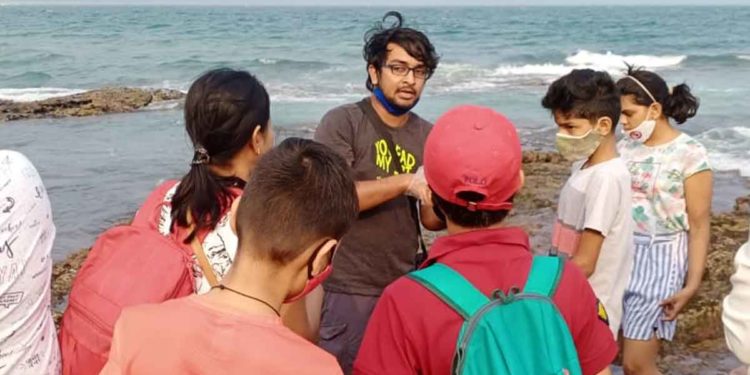We get so consumed with day-to-day activities that we often tend to ignore the fact that we are a part of a bigger ecosystem. In fact, to build our own habitat of a concrete jungle, we invade the homes of various species of wildlife. From the forests of Eastern Ghats to the vibrant fauna of the Bay of Bengal, Vizag hosts a variety of ecosystems. And as a tenant in their adobe, it is our responsibility to act in their protection and conservation.
Informing about the steps being taking for wildlife conservation, Anant Shankar, District Forest Officer (DFO), APFD says, “Currently, being a peak time for nesting, we have set up 4 turtle hatcheries along the coast of Vizag. The local fishermen around the hatcheries have been trained to maintain them. Soon, we hope to release the first batch of hatchlings into the sea.” Furthermore, officials plan on setting up camera trap exercises at Kambalakonda Wildlife Sanctuary to take note of different herbivore and carnivore habitation present there. “We take up rescue operations on a daily basis. Apart from that, we are also working on habitat management. We plan to set up habitations of grasslands, forest plantations, and provide water sources for the district’s wildlife,” says Mr Shankar.
Vizag also has a few non-profit organisations working towards the conservation of wildlife. Pranav from East Coast Conservation Team, in a conversation with Yo!, sheds light on the projects they have taken up. “We are working on the conservation of smooth-coated otters in Konndakarla Ava lake. We are also working on a larger project of identifying the presence of threatened mammals in the northern parts Andhra and their threats locally.” With regard to marine conservation, ECCT intends to work on collecting data on shark catch. “About 40 percent of sharks and rays in Indian waters are endangered or are vulnerable according to the International Union for Conservation of Nature (IUCN). But only 10 species out of more than a hundred species are being protected under the wildlife protection act in India,” says Pranav.
Another such dedicated non-profit organisation in Vizag is Greenpaws. Anil from Greenpaws shares, “We initially started with Greenwaves, an NGO working majorly on waste management. Owing to my educational background in environmental studies and my passion for the same, we set up Greenpaws to fund conservation events.”
While experts do their part to conserve the environment, they also urge the general public to be aware and take necessary steps for the same. “Firstly, I strongly advise citizens to be aware of the species being protected by the government. With illegal trade of animals, people often don’t realise owning certain species as pets could be against the law,” informs Anant Shankar, DFO, APFD. “Vizag has a vast set of ecosystems and biologists and conservationists cannot be omnipresent. Hence it would great if the public used the iNaturalist application and update any unusual sighting that they find,” suggests Pranav from ECCT. “Improper disposal of plastic waste poses a huge fatal threat to the marine biodiversity. Volunteering for beach clean-up events, using and disposing of waste responsibly are steps towards wildlife conservation,” shares Anil from Greenpaws.
It may be noted that several wildlife enthusiasts have even been organising special walks to sensitise citizens on different species of fauna.










Discussion about this post